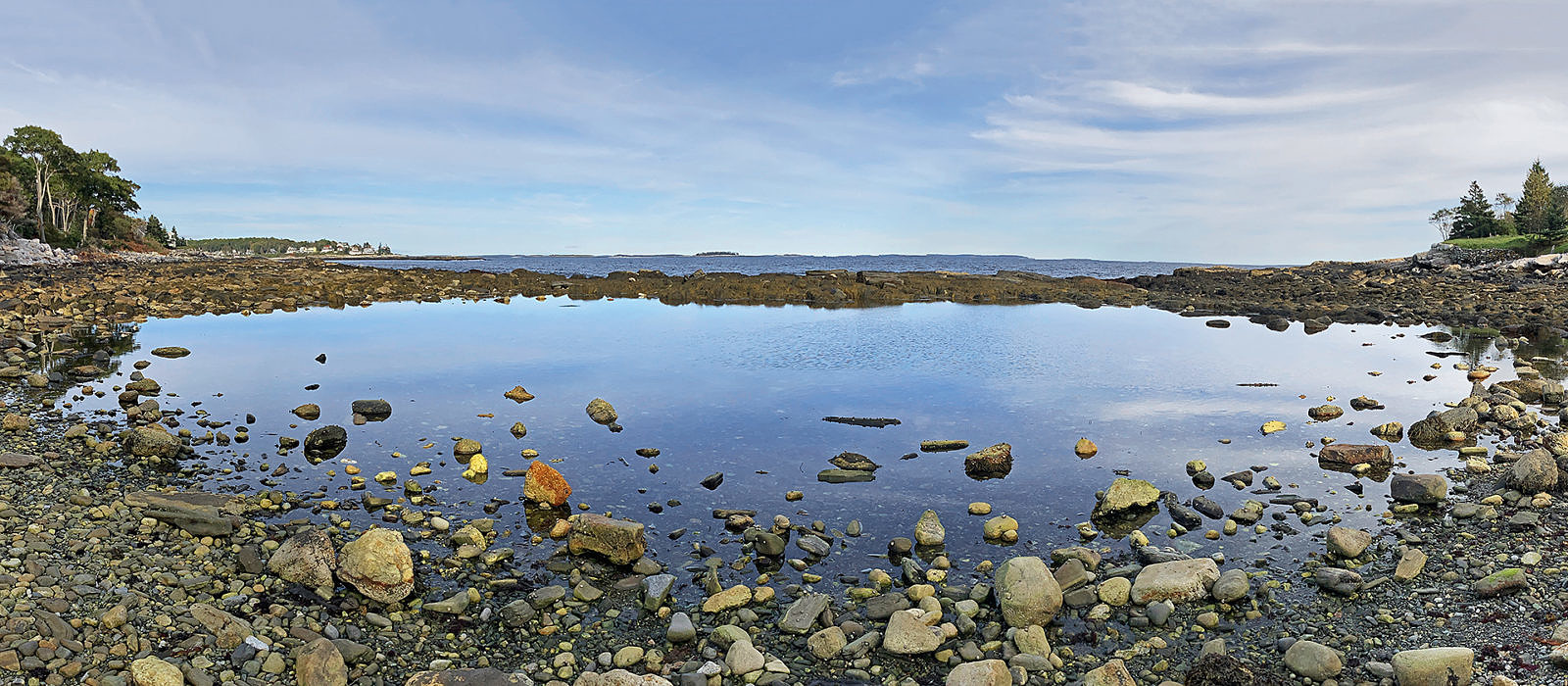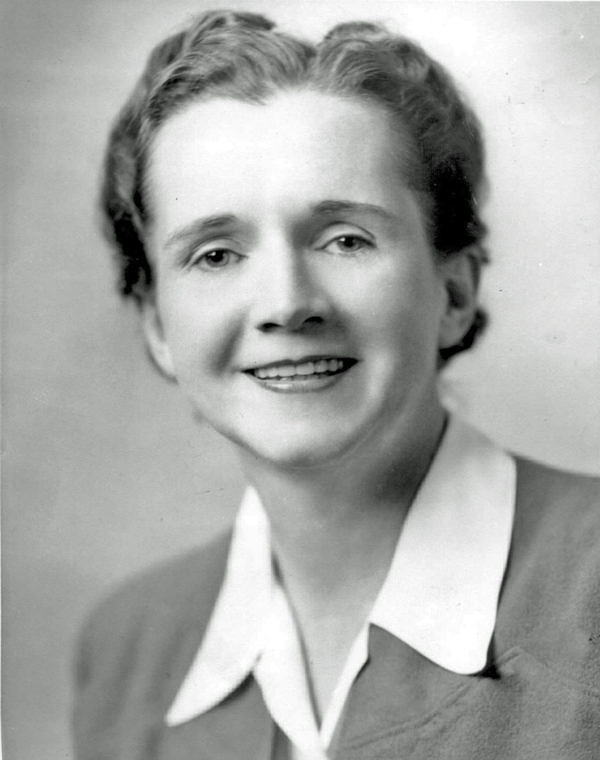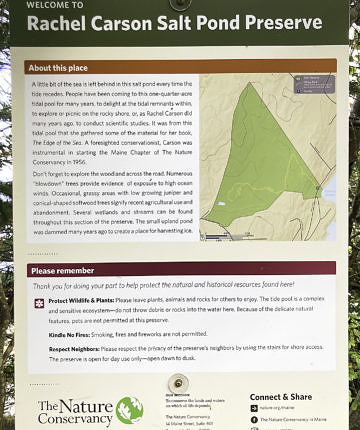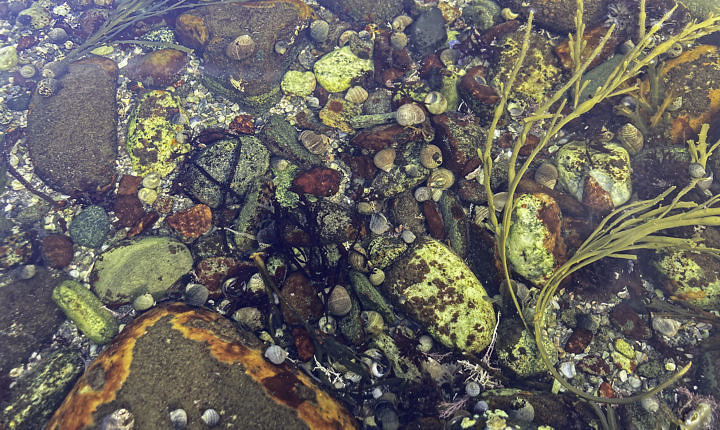
Silent Spring at 60
What if Rachel Carson's landmark book were published today?
My essay for The Boston Sunday Globe — in print June 12, 2022.
Before all that she gave us in Silent Spring, before she demonstrated that one person and a book can change the world, Rachel Carson gave us the sea.
A marine zoologist, Carson wrote a trilogy of books about ocean life and ecology. For research on the third, The Edge of the Sea, she used to visit a tide pool on Maine’s midcoast, to think among the periwinkles and barnacles, the herring gulls and knotted wrack. Sixty-seven years later, I have come to the very same pool, now the Rachel Carson Salt Pond Preserve, so that I might sit where she sat, see what she saw, and consider a question that has bothered me for years.
 Rachel Carson so loved the sea that she transported us there with the forces of science, passion, and prose that reads like poetry. Then, so alarmed about the chemical industry’s poisons, she wrote Silent Spring, first published 60 years ago this week, which helped inspire our modern era of environmental awareness and action.
Rachel Carson so loved the sea that she transported us there with the forces of science, passion, and prose that reads like poetry. Then, so alarmed about the chemical industry’s poisons, she wrote Silent Spring, first published 60 years ago this week, which helped inspire our modern era of environmental awareness and action.
One person, one book: Together they made the world safer for its wildlife and wild places — and for us.
What if Silent Spring were published today? Could one person still have the same kind of impact?
I timed my visit to the salt pond for lofty inspiration: low tide. That’s when the ocean, having advanced earlier in the day to flood an oval basin in the shoreline, had left behind a shallow pool with life from depths most of us will never visit. To a terrestrial biologist like me, whelks and seaweeds and urchins are born of some foreign kingdom. I nonetheless had a teacher and her book.
Carson was a public scholar and nature guide. Weaving science and wonder into lyrical prose, she gave us not only a way of seeking and knowing but also a way of being in nature. In The Edge of the Sea she writes:
To understand the shore, it is not enough to catalog its life. Understanding comes only when, standing on a beach, we can sense the long rhythms of earth and sea that sculptured its land-forms and produced the rock and sand of which it is composed; when we can sense with the eye and ear of the mind the surge of life beating always at its shores — blindly, inexorably pressing for a foothold.
So rather than merely cataloging the sea life at my feet, I took Carson’s admonitions beyond the pool, beyond the sea’s gently curving horizon, and into the storms beating at the shores of contemporary public discourse.
Carson was unequivocal: The misuse of pesticides, particularly DDT, harmed living things. Drawing on scientific research and bolstered by the immense popularity of her sea trilogy, Carson brought to shore, and into American neighborhoods, an eloquent and unapologetic devotion to nature and environmental protection. A masterpiece of scholarship and passion, Silent Spring is a moral call to action.
The chemical industry’s predictable assault on the book ranged from threats of lawsuits to fables of insects decimating the world’s crops. The personal attacks on Carson ranged from sexism to red-baiting.
But looking back on the industry’s reaction to Silent Spring, I am struck not so much that it happened but more by the reception and ultimate vindication of Carson by institutions: academia, the media, Congress, the White House. Sixty years ago, acrimony was not yet a convention of public policy. No Fox News, no Twitter, no algorithms. Congress quartered fewer overt liars and demagogues.
Were Silent Spring published today, it would no doubt draw a more ruthless fusillade of abuse. Pundits, having never bothered to read the book, would offer baseless claims to feed the beast of outrage media. Vitriol toward Carson would find refuge online and among members of Congress.
Yet in the 1960s, a woman and a book prevailed. Government, reason, and informed citizens carried the day. Carson was warning us about the perils of unchecked chemical technology. In so eloquently linking human and environmental health, Silent Spring inspired bans on harmful pesticides, including DDT, and laws protecting air, water, and vulnerable plants and wildlife. I can name no other author and book since to have had such impact.
Billionaires and celebrities now seem to have more influence than scientists.
I am under no illusion, however, that the triumph of Silent Spring was unqualified. Pesticides continue to poison our food and cause collateral damage to wildlife. Glowing screens and other online distractions take us further from nature. Billionaires and celebrities now seem to have more influence than scientists.
Reflecting on all this beside the tide pool, more than anything I felt wistful. Carson endured the assault of the chemical industry as breast cancer and debilitating pain were spreading through her body. Two years after the publication of Silent Spring, at age 56, she died before her victories.
Rachel Carson is rightly canonized because her book helped launch contemporary environmentalism. At the edge of the sea, however, I instead found solace in Carson herself — her confidence, her strength, her sense of purpose, and more than anything her reverence for nature.
“Those who contemplate the beauty of the earth find reserves of strength that will endure as long as life lasts,” she wrote. “There is symbolic as well as actual beauty in the migration of the birds, the ebb and flow of the tides, the folded bud ready for the spring. There is something infinitely healing in the repeated refrains of nature — the assurance that dawn comes after night, and spring after the winter.”
Banner image above: Rachel Carson Salt Pond Preserve — Bristol, Maine / © Bryan Pfeiffer



I was a graduate student in the entomology department of the SUNY College of Environmental Science and Forestry when Silent Spring was published. Oh the reaction of my advisor, you’d have thought Rachel Carson has insulted his wife, mother and all of his ancestors. I left the department soon after, one of the best decisions I’ve ever made.
Really well done, dear friend. And extra points – quite a few – for “quartered”. Nothing but net.
And I loved the last paragraph from her. Spot on. That’s why, I think, we so love our garden. (And fishing.) xoxo
Totally agree with your comments.
Hi Bryan, Just did some subtraction, I was older than in my teens because my younger sister took my book and let her boyfriend read it. I did get it back eventually but it never made it here in DSM, IA.
Well Bryan, I bought and read Silent Spring when I was still living at home in Brooklyn, I guess in my late teens. It was a wonderful book and I kept it for a long time, but it did not make the cut when I down seized moving from VT to Des Moines, IA. Your essay was so good to read and you are so right about Rachel Carson. Thank you.
Hey Bryan,
Well said as always. I especially loved the last quote. The beauty and wonder of nature is what keeps me hopeful in these very confusing and dare I say it, often dark times. Hope you and Ruth are well and see you soon.
We were so besotted with DDT (in may ways like we are now with computer technology). And, regrettably, I agree with you, Peter, on climate.
Thanks so much, Leo. It’s nice to hear from you. (And I hope your bird-spotting eyes are as sharp as ever!)
We do Bernie — and that’s meaningful.
Glad you’ve been there as well, Andrea. In an earlier draft of the essay, I mentioned Inconvenient Truth, End of Nature, Fate of the Earth, Diet for Small Planet. All impactful; none with the same relative outcome of Silent Spring.
I love that salt pond! Beautiful photo of it. I think industry learned their lesson after Silent Spring and the (very limited) federal action on agricultural chemicals that followed, and they did everything in their power to ensure that nothing would be done to combat climate change. We’ve had many cogent, well-researched, lyrically written books on climate change, and many other urgent environmental crises since Silent Spring, and it’s like so much whistling in the wind.
Grant ‘us’ the courage and strength, to do something with our reverence for nature.
I hope you get to see this Bryan. I love what he did with the children, one obviously black.
Fine writing and sensitivity from you Bryan as always. After four score and nearly eight on this planet, I find it too easy to be overwhelmed by the human ills of greed, ignorance and short-term thinking. There are some genuinely good works out there – in place and in the process of moving from heart to happening. I take faith in those works. The good stuff starts from the heart and by your good works, we all hear yours, Bryan. Best to you.
I lived on Main Street in Sandwich on Cape Cod during the 50’s. Main street was lined with mature elm trees where the draping canopy hosted Baltimore Orioles. The Dutch Elm Disease attacked the trees, and in a futile attempt to save the trees, the tree warden sprayed DDT without any protection. In time the elm trees died and were cut down.
As stark is that memory, so too today is the inexorable rise of the of the sea level. Cape Cod is a peninsula of sand, and unlike the rock coastline of Maine, the Cape shoreline is being battered and eroded resulting with numerous buildings collapsing or undermined.
Th impact of climate change is beyond our control. Rachel Carlson warned us about DDT 60 years ago, and it was outlawed. Global warming is beyond our control.
Thanks, Rick. Yeah, it’s shocking to look back and see how besotted the industry was with chemical technologies. I’m grateful for your seeing right through it in college. I wonder: do you get wistful at those Rachel Carson preserves?
Thanks, Gloria. You are most welcome!
Thanks, Kim. Sometimes I think Carson’s “courage and strength” are overlooked owing to the plain force of her warnings to us. In some ways, she had the courage and strength of Darwin. That and her reverence for nature are perhaps what I admire most about her to this day.
Thanks, Bruce. I sense that pull of the sea in me — but since I don’t get there as often, it’s always so new and full of discoveries. I think more than anything, I like walking the tide lines and looking down at the signs of life cast ashore. I could do it for hours and hours. Carson inspired that in me.
“Brave and brilliant” — so true. Thanks, Roxanne!
Very kind and well-stated, David. Thanks. Send my best to Giovanna and Sterling!
Thanks, Linda. Lovely words.
Thanks SO MUCH for this, Cynthia. I hope to make a visit some day!
My brother, Douglas Alvord, was a sculptor and artist. He created this sculpture, “A Sense of Wonder” of Rachel Carson at the North Carolina Museum of Natural Science. He loved her works.
http://susanives.com/2020/06/01/mondays-monument-rachel-carson-statues-woods-hole-massachusetts-raleigh-north-carolina/
(It’s the second picture).
Rachel Carson opened minds. She had an impact on those of us who sat by tide pools, watched dragonflies and listened to the natural world. A book, a poem , a song – one individual can touch a mind and a heart. Keep writing, Bryan. Hearts are listening and spreading the word.
Thank you Bryan. We can never be reminded too frequently of the truth , especially when it is poetically wrapped . Having lived and worked in our Maine coastal ( and other ) webs , I have watched for over fifty years the mostly negative changes upon us. Practicing small efforts, picking up trash , advocating for sanity and pushing the values of those about us relentlessly are all worthwhile. Every ribbon of kelp , every speckled egg in tidal nest and every breeze in the marsh is a part of everything everywhere.
D
Beautiful, poignant and important, thank you Bryan. An insightful article about a brave and brilliant woman, whom I deeply admire and respect for all the reasons you describe here. Under the Sea Wind alone is a poetic masterpiece
Thanks for sharing Bryan. Beautifully, written, reflective piece that slowed me down and reminded me why I chose conservation biology and vice-versa, as the pathway for my life. I am alternately puzzled and amused when I ponder my “choice” to become a terrestrial ecologist, each time I succumb to the strong gravitational pull of the sea.
Yes, it’s so disappointing that money and power have steamrolled over common sense and a concern for the health and welfare of the broader population. I hold a deep sadness in my heart for humankind’s selfishness and unwillingness to learn. For a species that likes to boast that “we’re the smartest,” the irony is thick.
Thank you for reminding us of Rachel’s courage and strength — I needed to hear this today. And you’ve inspired me to go back and re-read Silent Spring over the coming 95+ degree days.
As always, a beautifully written and eye-opening essay. Thank you, Bryan.
Thanks Bryan.
In the mid 1970s, I found myself in an entomology class at the University of New Hampshire. The professor mentioned “Silent Spring” in passing one day (a book I had devoured along with “Sand County Almanac” and “One Day at Teton Marsh” that previous summer) referring to it as the rantings of an ill-informed emotional woman. Being too intimidated as a wet-behind-the-ears undergraduate to take him on, I instead did a little research and discovered that this professor’s research focus was on pesticides for big agriculture. No wonder.
Since then, I’ve read most of what Carson has written, visited a number of sites along the coast of Maine where she worked and lived, and enjoyed several biographies including a book of correspondences she shared with a close friend. An amazing person indeed!
Cheers, Rick